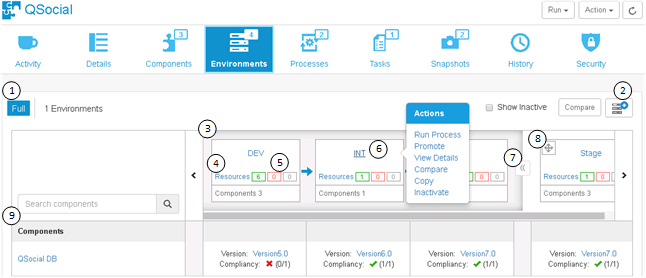Once you have created environments in the Environments page, you can add them to applications individually or as part of a pipeline. The Environments page for an application is shown in the following figure.

- View the pipeline name (if any) and the number of individual environments above the environments box.
- Add more environments to this application.
- Scroll a graphical view of environments. Any pipeline is indicated by a gray box; any individual environments follow.
- Click Resources to get a quick view of the resources associated with the environment. From there you can click View Resources to open the resources tab for the environment.
- See a breakdown of the number of environments in online, offline, and unknown status.
- Click the environment name to see a menu of options for that
environment. Use a quick single-click or a double-click to select one of the
options. Only relevant options appear. Possible options are:
- Run Process: Run an application process in this environment.
- Promote: Execute the active process in the next environment in the pipeline.
- View Details: View and configure application-specific settings for the selected environment.
- Compare: Compare the inventory of up to four environments.
- Copy: Create an environment based on this environment. Upon creation, the environment is automatically added to the application.
- Inactivate: Set the environment to inactive status. Inactive environments are not shown in the list by default. You can use the Show Inactive check box to show them in the list.
- Click the double arrows beside the pipeline to contract or expand the pipeline in the view.
- Move individual environments to another position.
Note: Pipelines cannot be moved. Only one pipeline can be associated with an application at a time and it always comes before any individual environments.
- Filter the components shown in the list by using search criteria.
For details on creating environments and configuring global settings, see Managing Environments.
For more details about the environment inventory, see Viewing the Environment Inventory.
For more details on configuring application-specific environment settings, see the following topics: